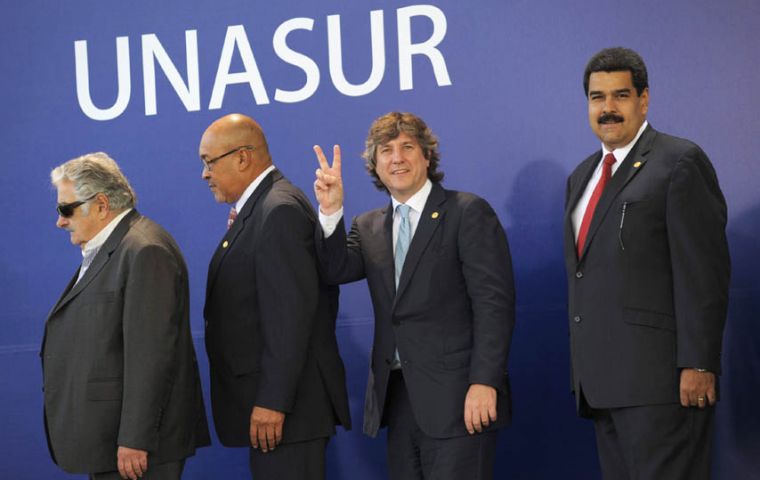MercoPress. South Atlantic News Agency
Unasur summit rejects Falklands’ referendum and wants to limit ‘vulture funds’
 Vice-president Boudou expressed Argentina’s satisfaction with Unasur’s support (Pic EFE)
Vice-president Boudou expressed Argentina’s satisfaction with Unasur’s support (Pic EFE) The Union for South American Nations (Unasur) agreed to limit the actions of ‘special situation funds’ (hedge funds or ‘vulture funds’) and categorically rejected a referendum that will take in place in the Falkland Islands in March to decide the political status of the archipelago, during the summit that took place in Lima.
“Both issues were fully backed by Argentina and included in the final document approved in the meeting,” Argentine Vice-President Amado Bodou stressed on Friday at the end of the summit where he represented President Cristina Fernández, who did not attend due to back pains.
“It was a really important meeting due to two issues that were mentioned in the final communiqué. One is an explicit rejection to the self-determination and referendum that will take place in Malvinas islands and its eventual result. This reaffirms Argentina and the UN’s 1985 stance. This is a political success for the President, but above all for Argentines.”
Boudou also referred to the inclusion of an initiative to move forward against the so called ‘vulture funds’, following Judge Thomas Griesa's ruling, which benefited bondholders who did not accept to be a part of the debt swaps offered by Argentina in 2005 and 2010.
The final resolution actually refers to ‘special situation funds’, a concession to Brazilian diplomacy which apparently does not share the Argentine expression ‘vulture funds’.
“These vulture funds are destabilizing factors, but they also ruin developed countries because they do not pay taxes anywhere. And won’t allow countries and their creditors to reach voluntary accords, like Argentina, in which 93% of creditors accepted the proposal” said Boudou.
He added that Unasur was considering calling a special conference next February to address specifically the issue and others closely linked such as the credit rating agencies, which President Cristina Fernandez in her latest appearances described as part of a global “judicial colonialism”.
Boudou said that the Argentine president sent to the Unasur “a message on the need for a new international financial structure because the crises continue and we, Argentina have concrete proposals based on four axis actions”.
The first refers to the need of having “appropriate mechanisms for the restructuring of sovereign debts while another calls for a review of the IBT, international bilateral treaties”.
Another refers to the redefining of the World Banks’ International Centre for the Settlement of Investment Disputes tribunal, and looking “for alternative mechanisms” to fix disputes between sovereign countries and corporations. “The ICSID does not offer fair rulings and has a concept of favouring trans-national corporations, so at the end of the day this is not justice but biased processes”.
But the main axis of Cristina Fernandez’ presentation refers to the urgent need to review credit risk agencies, for which “we are calling for an extraordinary meeting next February, so all this does not end up in an exercise of rhetoric”.
Boudou accused the risk rating agencies of being “the cause behind the international financial crisis” and the Argentine government formally requests their “replacement or elimination”.
“Let us not forget that the risk-rating agencies are mandatory for any investment, and the truth is that they have failed, they have wrongly advised on how to best employ resources” insisted Boudou.
Unasur chair and host Peruvian president Ollanta Humala sent a message of unity saying that “our coming together as a group will be the base in order to construct a South American citizenship, making it into a reality”.
Humala added that decisions should be made in order “for us to be authentically South American,” stating that “physical integration continues to make up the backbone of integration.” He insisted that “while other regions look for ways to overcome crisis, we are at a stage in which we can continue to grow.”
The sixth Unasur summit brought together heads of state and representatives from eleven of its twelve member countries including Argentina, Brasil, Bolivia, Colombia, Chile, Ecuador, Guyana, Peru, Surinam, Uruguay and Venezuela since Paraguay has been suspended as a member since June; therefore Paraguayan President Federico Franco was not invited to participate in the event.
Nevertheless there were some notorious absences such as Venezuelan President Hugo Chávez, Brazilian President Dilma Rousseff, Bolivian President Evo Morales and Argentine President Cristina Fernández.
Other issues referred to by the summit was support for the Colombia-FARC peace talks, discussions on some border disputes and confirmation of Paraguay’s suspension from Unasur as originally established until April 2013 elections.




Top Comments
Disclaimer & comment rules-

-

-

Read all commentsMeanwhile, back on planet Earth.....
Dec 01st, 2012 - 07:52 am 0Panto time !
Dec 01st, 2012 - 08:03 am 0cue the Trolls...
Unasur need to get serious. They let Argentina mess around talking crap about some islands nobody cares and about a solution to a bond problem that no longer exists as almost all have agreements re: number of people who say yes and no to a restructuring.
Dec 01st, 2012 - 08:21 am 0They could be talking about moving forwards in technological terms, Generating electricity in a green way, advancing education levels and eradicating corruption and poverty in the continent.
but no, lets talk about unimportant issues like some people deciding on their future and a debt caused by pure incompetence of argentine governments....
Commenting for this story is now closed.
If you have a Facebook account, become a fan and comment on our Facebook Page!